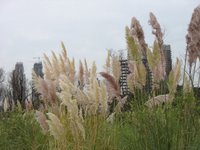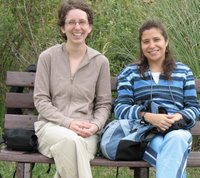sifting over scraps
Every night as I fall asleep, I hear the rubbish collectors and sorters down on the street below. Unlike the recent story in England about the man who was nearly fined £50 for putting junk mail in a litter bin, in Buenos Aires, everyone puts out their rubbish on the street each night. Before the city rubbish trucks come round though, the rubbish is picked over by organized and industrious groups of children and adults, salvaging what they can. Cardboard, plastic, glass and other recyclable materials are stacked neatly into handcarts or piled up high behind a horse.
So when I wrote last week that I couldn't find any evidence of the recycling movement, I was forgetting this very present part of life here. The people who sift nightly through my rubbish and others as like may Argentines who have had to find new ways of surviving following the 2001/02 economic crisis. Talk about living off the scraps thrown from the table. But as the women struggling to keep her daughter alive reminded Jesus (Mark 8.24-30), those hidden at the very edges of our societies also have people they love and care for, and their own hopes for the future. And they deserve more than the split and overflowing sacks of leftovers we leave for them.
In other countries, support for people who live off (or even on) the rubbish piles, is beginning to be accompanied by education in the wider society about the importance of recycling. In Porto Alegre, for example, Habit for Humanity were working with a community of rubbish collectors who had managed to win the right to the island on which they lived and sorted the waste. And in Sri Lanka, Christian Aid is working with the Methodist Church on projects who combine education on reducing waste, with support for those whose livelihood currently depends on it. www.christian-aid.org.uk
The BBC seem to be having the same line of thought this week! Visit the From Our Own Correspondent webpage where you can read or listen to a 5 minute piece from Daniel Schweimler the BBC correspondent from Buenos Aires on, among other things, the rubbish collectors.
http://news.bbc.co.uk/1/hi/programmes/from_our_own_correspondent/default.stm
Some news from me now. Tomorrow I will have my last Hebrew class in the intensive course, although classes will continue at a slower rate during the first semester. I'll also be doing some revision work on my Greek, taking a class on John's letters to help me experience at first-hand Latin American methods of exploring the Bible, a class on interpretive methods in general, and a class on theology and economics. I'm also hoping to do a practical placement with a women's group or organization in the city, beginning to read some of the Latin American feminist theologians I want to study and meeting with my supervisor to develop my focus for my research. All this sounds a lot! But here, the focused research doesn't begin in earnest until maybe the second year - the first year is more of a filling in the gaps.
I had a lovely weekend away from studies, visiting on Saturday the ecological rsearve in between the docklands and river edge. And finally going ice-skating on Sunday! No photos of ice-skating yet!...

Grasses and the towers of Costanera Sur in the background.

me and Marcia taking a quick rest before the mosquitos found us!

Stella Mar: Mary, the Star of the Sea - the folds of her cloak fell like a mermaid's tail.
more next week.
So when I wrote last week that I couldn't find any evidence of the recycling movement, I was forgetting this very present part of life here. The people who sift nightly through my rubbish and others as like may Argentines who have had to find new ways of surviving following the 2001/02 economic crisis. Talk about living off the scraps thrown from the table. But as the women struggling to keep her daughter alive reminded Jesus (Mark 8.24-30), those hidden at the very edges of our societies also have people they love and care for, and their own hopes for the future. And they deserve more than the split and overflowing sacks of leftovers we leave for them.
In other countries, support for people who live off (or even on) the rubbish piles, is beginning to be accompanied by education in the wider society about the importance of recycling. In Porto Alegre, for example, Habit for Humanity were working with a community of rubbish collectors who had managed to win the right to the island on which they lived and sorted the waste. And in Sri Lanka, Christian Aid is working with the Methodist Church on projects who combine education on reducing waste, with support for those whose livelihood currently depends on it. www.christian-aid.org.uk
The BBC seem to be having the same line of thought this week! Visit the From Our Own Correspondent webpage where you can read or listen to a 5 minute piece from Daniel Schweimler the BBC correspondent from Buenos Aires on, among other things, the rubbish collectors.
http://news.bbc.co.uk/1/hi/programmes/from_our_own_correspondent/default.stm
Some news from me now. Tomorrow I will have my last Hebrew class in the intensive course, although classes will continue at a slower rate during the first semester. I'll also be doing some revision work on my Greek, taking a class on John's letters to help me experience at first-hand Latin American methods of exploring the Bible, a class on interpretive methods in general, and a class on theology and economics. I'm also hoping to do a practical placement with a women's group or organization in the city, beginning to read some of the Latin American feminist theologians I want to study and meeting with my supervisor to develop my focus for my research. All this sounds a lot! But here, the focused research doesn't begin in earnest until maybe the second year - the first year is more of a filling in the gaps.
I had a lovely weekend away from studies, visiting on Saturday the ecological rsearve in between the docklands and river edge. And finally going ice-skating on Sunday! No photos of ice-skating yet!...

Grasses and the towers of Costanera Sur in the background.

me and Marcia taking a quick rest before the mosquitos found us!

Stella Mar: Mary, the Star of the Sea - the folds of her cloak fell like a mermaid's tail.
more next week.
Comments
Alison Parker